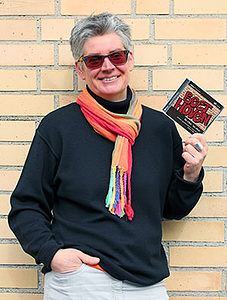Beethoven for Choir
The “Moonlight Sonata”, the Appassionata, a violin sonata for choir? Is this really necessary? Isn’t there enough original music by Beethoven already? Isn’t there something slightly disrespectful about this? Karen Priebe’s background is as a pianist, and she is a professed fan of classical piano music, so she was both curious and a little sceptical when she first heard about the new Beethoven for choir CD. Naturally she first listened to the Kyrie based on the first movement of the “Moonlight Sonata”, and was lost in reverie from the first measures. She has found her favorite piece!
My current favorite CD is the Beethoven for choir CD. It takes a lot to really move me, but the Kyrie from the Beethoven for choir CD bowls me over every time and reduces me to tears. The Moonlight Sonata, the Appassionata, a violin sonata for choir? Is this really necessary? Isn’t there enough original music by Beethoven already? Isn’t there something slightly disrespectful about this?
My background is as a pianist, and I am a professed fan of classical piano music, so I was both curious and a little sceptical when I first heard about the new Beethoven for choir CD. Naturally I first listened to the Kyrie based on the first movement of the Moonlight Sonata, and was lost in reverie from the first measures. I have found my favorite piece! After a continuous loop of about ten repetitions, I then listened to the other tracks and came to the conclusion that Beethoven himself must have composed these works just like this.
And that is partly true. The 19 pieces on the CD, which are mainly quite short, include some works originally written by Beethoven for choir, plus fragments which have been completed in his style. Both contemporaries of Beethoven as well as modern composers and arrangers have taken on his works, arranged instrumental pieces and songs, and thereby created even more gems. These are not pastiche-like reproductions.
My immersion in these arrangements also led me to listen to some of the original versions again, this time more consciously, for example the Violin Sonata no. 7 (set as Tränentrost (Tears of comfort), no. 18 on the CD) and the 2nd movement from the 7th Symphony (Persischer Nachtgesang (Persian Nocturne), no. 16). And the texts used as a basis or adapted (not only by Goethe, Schiller, Gellert, and others) inspire us to study the poets more closely. The setting of the Erlkönig text by Johann Wolfgang von Goethe (no. 6) is moving and ideally matched: I had not expected that through voice divisions and the use of vocal color in the choir, the feeling of tension could be increased so much more than in familiar interpretations of the ballad. By contrast, the song Ich liebe dich (no. 4) is wonderfully relaxed with notes and beatbox syllables placed in the different choral parts.
This magnificently-compiled program contains a truly diverse range of contents which also offers the opportunity to sing in various different languages. The Deutsche Jugendkammerchor under Florian Benfer offers interpretations at the highest level, with many pieces enhanced by the understated and sensitive piano accompaniments of Nicolai Krügel.
As a choral singer you are then really inspired to work on one or another piece yourself, for we should honor the genius of Beethoven not only in his anniversary year. Even if you have perhaps already planned this year’s programs, these little gems on the CD (with more in the Beethoven Choral Collection) are highly suitable as encores, will be familiar to audiences, and are sure to be popular in programs over the coming years.
So why not include Beethoven’s version of O du fröhliche (included in the Choral Collection Beethoven, but not on the CD), or Auld lang syne – also arranged by Beethoven. Also there is the wonderful Freude Quodlibet by Gunnar Eriksson, a humorous treat which combines various folk songs such as Bruder Jakob (Frère Jacques) with that famous melody from the 9th Symphony.
And now I need to return to the CD player … and press repeat.
After several years working in music retail and wholesale, Karen Priebe joined the Sales Department at Carus-Verlag in February 2020. In her free time she is an enthusiastic honorary aunt, dog-sitter and frequenter of cafés, and spontaneously meets up with friends to make music with singing, piano, and red wine.






Leave a Reply
Want to join the discussion?Feel free to contribute!